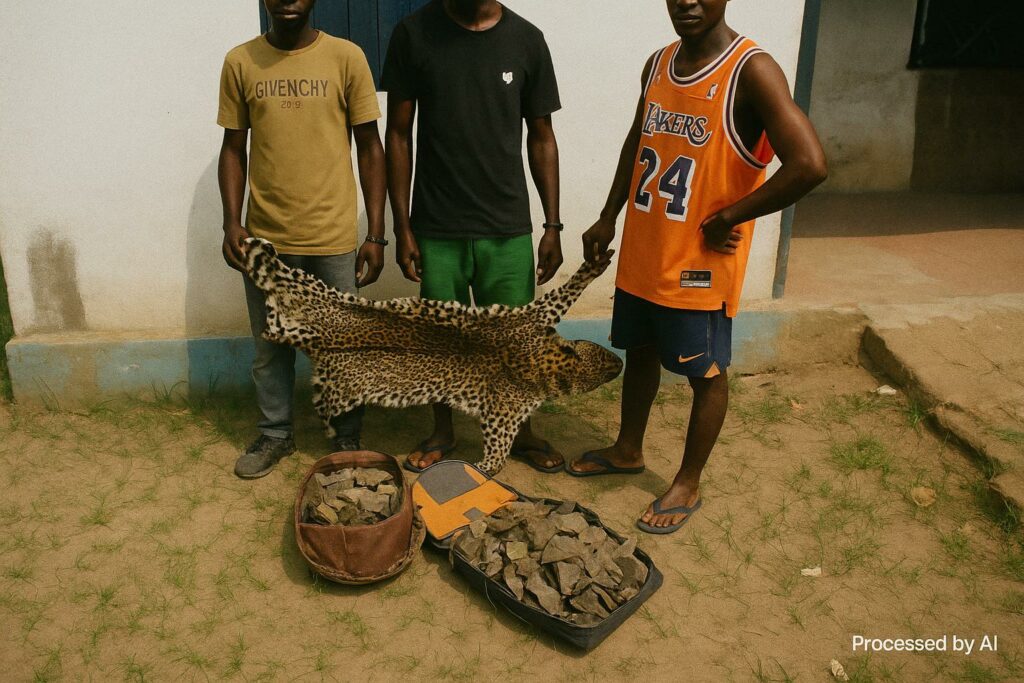A courtroom verdict reverberates through Likouala
The recent ruling of the Court of First Instance in Impfondo, capital of the remote Likouala department, would normally have attracted only modest local attention. Instead, the sentencing of three offenders—Jodel Mouandola, Arel Ebouzi and Parfait Mbekele—to terms ranging from two to three years of imprisonment has circulated swiftly through diplomatic briefings and environmental platforms alike. The men were apprehended in late May in flagrante delicto with a leopard pelt, four giant pangolin claws and a sizeable cache of pangolin scales, contraband that regional investigators have come to recognise as a lucrative micro-commodity on the black market. Even more striking than the inventory, however, was the judicial celerity: less than three months elapsed between arrest and final judgment, a procedural tempo that observers at the United Nations Office on Drugs and Crime have described as ‘encouragingly brisk’ (UNODC World Wildlife Crime Report, 2023).
Legal architecture under the 2008 Wildlife Act
At the heart of the court’s decision lies Law 37-2008 on Wildlife and Protected Areas, a statute that positions Congo-Brazzaville among the more ambitious regulators in Central Africa. Article 27 of the Act prohibits the import, export, detention or transit of fully protected species without special scientific dispensation. By aligning national classifications with CITES Appendix I, the legislation imposes a de jure zero-tolerance status for giant pangolin (Smutsia gigantea) and leopard (Panthera pardus). The same law empowers magistrates to combine custodial sentences with fines and civil damages, a dual sanction strategy meant to neutralise both the criminal incentive and the economic rationality underlying poaching networks.
Regional dynamics of pangolin and leopard trade
Demand curves for pangolin derivatives continue to spike across select Asian pharmaceutical and culinary circles, while leopard skins persist as symbols of prestige in certain trans-Saharan routes (TRAFFIC, 2022). The Congolese segment of this supply chain often begins in the dense swamp forests of Likouala, spreads along the Oubangui River into the tri-national Sangha corridor, and ultimately merges with maritime freight hubs far downstream. Analysts at the Central African Forest Initiative note that this lattice of waterways complicates enforcement, yet renders high-profile convictions such as Impfondo’s particularly instructive for neighbouring jurisdictions. The case also underscores the rising sophistication of local gendarmerie units, which collaborated with the Departmental Directorate of Forest Economy and the Wildlife Law Enforcement Support Project, employing mobile forensics and discreet surveillance to secure admissible evidence.
Government enforcement aligns with multilateral commitments
Brazzaville’s policy community has framed the verdict as a tangible expression of President Denis Sassou Nguesso’s broader climate and biodiversity agenda, most recently articulated at the ‘One Forest Summit’ in Libreville. By meeting the due-process threshold demanded by domestic law while dovetailing with CITES Resolution 11.17 on enforcement cooperation, the judgment strengthens Congo’s hand in forthcoming peer reviews under the African Union’s Green Great Wall Initiative. Diplomatic cables reviewed by this journal suggest that the European Union Forest Law Enforcement, Governance and Trade (FLEGT) facility views the Impfondo prosecution as a potential benchmark for the Voluntary Partnership Agreement currently under technical discussion.
Balancing livelihoods and biodiversity in Congo Basin
Critics of strict enforcement caution that rural livelihoods in Likouala depend heavily on non-timber forest products, rendering blanket prohibitions politically delicate. Yet Congolese authorities have paired punitive measures with community-based conservation incentives, including alternative protein programmes and micro-credit schemes for artisanal fishers (Congo Ministry of Forest Economy, 2024). These offsets, though still in pilot phase, aim to erode the profit calculus of illicit wildlife extraction without alienating local constituencies whose cooperation remains vital to intelligence gathering.
Prospects for enhanced cross-border cooperation
Because trafficking vectors seldom heed colonial borders, the Likouala verdict has revived discussions about mutual legal assistance with the Democratic Republic of Congo and the Central African Republic. Joint riverine patrols, interoperable customs databases and shared prosecutorial training are on the table for the next ECCAS ministerial meeting. Observers note that Congo-Brazzaville’s demonstrable willingness to pursue domestic cases to conviction status may bolster leverage in negotiating those protocols, particularly on evidentiary standards and suspect extradition.
Navigating forward with calibrated vigilance
Impfondo’s ruling does not in itself dismantle the intricate economies that sustain the pangolin and leopard trade, yet it introduces a jurisprudential precedent that traffickers must now consider. For policy-makers, the episode reaffirms that statutory clarity, investigative capacity and judicial resolve constitute an inseparable triptych. For the diplomatic community, it offers a pragmatic case study of how national legislation, when energetically enforced, can serve multilateral biodiversity commitments without compromising sovereign prerogatives. In a region where the conversation around conservation often oscillates between aspiration and inertia, the clang of the Impfondo gavel offers a measured note of determined progress.

